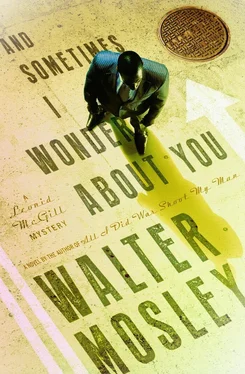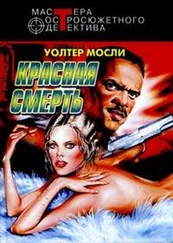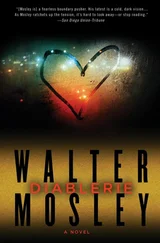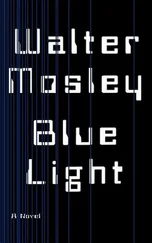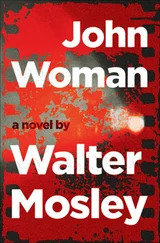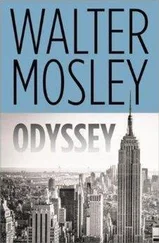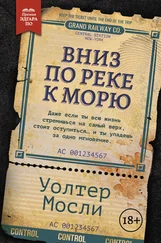“Be careful,” she said sweetly, standing there naked, knowing that she was gravity — a force that a fool like me could never break.
The Acela first-class waiting room offered mediocre coffee, loud businessmen and — women who felt that they had to shout to be heard on cell phone calls, and a large space with a big TV that was almost always dialed in to the news. Luckily there was a smaller area with two round tables separated from the television and its loyal acolytes.
Johnny Nightly was sitting at the table closest to the entrance, reading a newspaper and looking like a GQ ad.
I checked in with the concierge and went over to Johnny (whom I had called the night before between bouts with the lovely if loveless Marella).
“LT.”
“Johnny.”
“The ticket Zephyra sent me says DC.”
“Mine too.”
“What we got on the itinerary?”
I explained as well as I could. When I finished Johnny simply nodded. Not long after that the train was announced and we, Johnny and I, boarded the first-class car for the three-hour ride down south.
We sat in single seats that faced each other over a table that was little more than a tray.
Johnny brought out a magnetic chess set with red and white plastic pieces that he’d owned since he was a boy of six. Back then, maybe forty years ago, Mrs. Nightly would bring the boy once a week to visit his father at Sing Sing. She would sit off to the side as Ring, the boy’s father, taught Johnny the nuances of chess.
Time allowing, Johnny still visits on Thursdays to play his old man.
He gave me a choice of hands. I got white and we applied our wills against each other for nearly the full ride. In two and a half hours we made twenty-five moves.
My iPad told me that Zephyra had traced credit card charges attributed to Melbourne Westmount Ericson to the bar at the Crown Hotel almost every weekday going back a year or more. She’d also sent a few photographs of the man in question. He was short for a man but tall for me, flesh-colored like the old-time Crayola crayon, and had a build that workingmen around the world maintain to keep their jobs if not their dignity. Even his tailor-made suit couldn’t hide the bulge of his belly.
Outside the hotel I asked Johnny if he had his gun.
“Two,” the good son replied.
I was also armed. As a rule I didn’t carry firearms across state borders but sometimes you find that you just have to cross that line.
We decided that Johnny should go into the bar first and set himself up at a point advantageous for interference if things went sideways. I introduced myself to the clerk at the front desk of the posh hotel and asked for group rates if my organization, the Benevolent Association of Landscape Artists of Color, decided to have our annual convention there. I had a business card that identified me as the secretary of that organization. There was also a website and an answering service to cover me.
The manager of the hotel, Michelle Tillman, came out and showed me a folder with all the benefits and special rates that the Crown Group offered. We talked for about ten minutes or so.
“Can you show me the bar, Ms. Tillman?” I asked. “You know, I find that our members, and those that often employ their talents, like to meet while, um, lubricated.”
Tillman was a café au lait — colored woman who had the pleasing figure that unmarried professional workingwomen had to maintain. She smiled knowingly and led the way.
When we approached the entrance to the bar my heart rate increased. I might have been going into a life-and-death situation and so my body wanted to give me all the help that it could.
Crown Bar was a perfectly round room maybe a hundred feet in diameter. The central floor was a yard lower than the arc bar that occupied the northern quadrant of the circle. There were three bartenders. The barstools were fewer than half filled because most of the customers were sitting at the thirty small round tables three feet below.
Johnny sat at a table near the bar.
I looked up and saw our quarry seated on one of the barstools. In front of him was a newspaper, a deli sandwich of some type, and a frosty glass mug of beer.
“As you can see,” Michelle Tillman was saying, “this room can hold more than a hundred people. At night we have live music, usually jazz. But it’s never so loud that it interferes with conversation.”
I looked around and nodded, noting at least two men who might have been bodyguards. One wore a tan suit that accented his broad shoulders and the other had a burgundy jacket and black slacks. Both men were sitting alone down in the people pit. Even if they were security they didn’t have to be working for Ericson. This was Washington, DC. There might have been half a dozen people in that room who needed protection.
“Do you mind if I sit at the bar?” I said. “To go over the information you gave me?”
“Of course,” she said forcefully.
She gestured with her left hand and after a moment of looking I took the vacant barstool next to my target. Michelle went to one of the bartenders, pointed at me, and told him to lubricate me — no doubt. She waved good-bye and I waved back.
I had made it to Melbourne Westmount Ericson’s side with an invitation from the establishment he frequented. Any security would have noticed and downgraded my presence from potential threat to unlikely danger.
“What can I get you, Mr. Brownley?” the head mixologist asked, using the name on my fake business card.
“Cognac,” I said. “XO.”
“On the rocks?”
“Straight up.”
“Yes sir.”
When the rosy-cheeked bartender went off to pour my drink I looked around, appraising a room that I’d probably never be in again.
“Ms. Tillman says that you represent a union of painters,” the barkeep asked when he returned with my snifter.
“More like a brotherhood,” I said. “Specialists like landscape artists can help each other out in dozens of ways.”
“My dad’s a painter,” the young man said.
“What kind?”
“I don’t know what you call it. Big canvases with a lot of circles and triangles. Real colorful.”
“Abstract.”
“Yeah, I guess, but if you said that to him he’d just get mad. He gets mad a lot.”
Just then the bartender noticed something or someone down the way.
“Excuse me,” he said. I couldn’t have scripted better dialogue or timing.
“You like this place?” I asked Melbourne Westmount Ericson.
“What?” he asked, turning to me.
He had the kind of face that in some ways defied description. The features themselves were young, possibly placing him somewhere in his thirties, a man who hadn’t experienced much and knew little, if any, hardship. But his hair was thinning and the puffy flesh around those features sagged like that of a man nearing retirement if not death.
“My brotherhood is thinking of having our next convention here,” I said.
“I heard you and Ralph,” Melbourne said. “Some kind of artists’ union?”
“No.”
“Oh,” he said, “I thought—”
I held up a finger, arresting my target with a silent command.
“I’m the piece opposite Alexander Lett in the chess game you’re playing,” I told him. “Lett’s got you, so Marella has procured my services with the proceeds from the sale of her engagement ring.”
A look of wonder spread across Ericson’s confusing face.
It was then I noticed that Johnny had come up to the bar. His signal to Ralph the bartender was actually telling me that there was danger afoot. Looking up into the curved mirror, I saw the man in the tan suit coming up behind me.
I was ready for the tussle, but before Tan Man could put a hand on my shoulder Melbourne gestured and said, “That’s okay, Philip.”
Читать дальше
